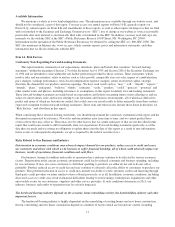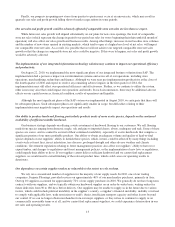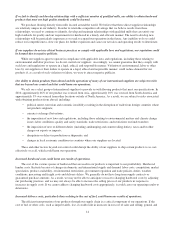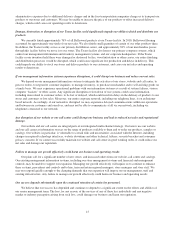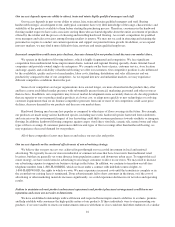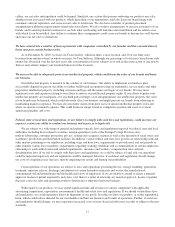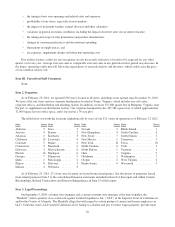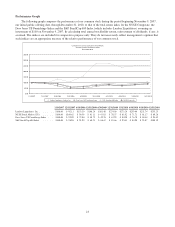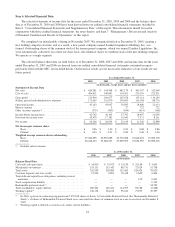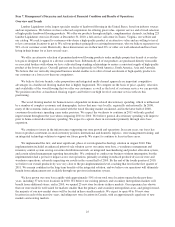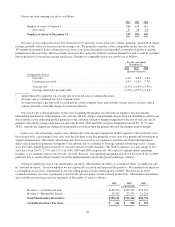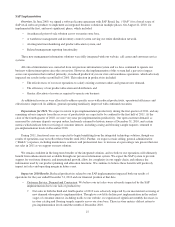Lumber Liquidators 2010 Annual Report Download - page 23
Download and view the complete annual report
Please find page 23 of the 2010 Lumber Liquidators annual report below. You can navigate through the pages in the report by either clicking on the pages listed below, or by using the keyword search tool below to find specific information within the annual report.caliber, our net sales and reputation could be harmed. Similarly, any actions that persons endorsing our products may take,
whether or not associated with our products, which harm their or our reputations could also harm our brand image with
consumers and our reputation, and cause our net sales to deteriorate. We also have a number of product placement
arrangements with home improvement-related television shows. We rely on these arrangements to increase awareness of our
brands, and to enable potential customers to see both what our flooring will look like after installation and the relative ease
with which it can be installed. Any failure to continue these arrangements could cause our brands to become less well-known
and cause our net sales to deteriorate.
We have entered into a number of lease agreements with companies controlled by our founder and this concentration of
leases may pose certain business risks.
As of December 31, 2010, we lease our Toano facility, which includes a store location, and 26 of our other store
locations from entities owned, in whole or in part, by Tom Sullivan. Although our percentage of total stores leased from such
entities has decreased over the last few years, this concentration of leases subjects us to risk in the event action or inaction by
Tom or such entities impacts our leasehold interests in the locations.
We may not be able to adequately protect our intellectual property, which could harm the value of our brands and harm
our business.
Our intellectual property is material to the conduct of our business. Our ability to implement our business plan
successfully depends in part on our ability to further build brand recognition using our trademarks, service marks and other
proprietary intellectual property, including our name and logo and the names and logos of our brands. We may incur
significant costs and expenses relating to our efforts to enforce our intellectual property rights. If our efforts to protect our
intellectual property are inadequate, or if any third party infringes on or misappropriates our intellectual property, the value
of our brands may be harmed, which could adversely affect our business and might prevent our brands from achieving or
maintaining market acceptance. We may also encounter claims from prior users of similar intellectual property in locales
where we operate or intend to operate. This could harm our image, brand or competitive position and cause us to incur
significant penalties and costs.
Federal, state or local laws and regulations, or our failure to comply with such laws and regulations, could increase our
expenses, restrict our ability to conduct our business and expose us to legal risks.
We are subject to a wide range of general and industry-specific laws and regulations imposed by federal, state and local
authorities including those related to customs, foreign operations (such as the Foreign Corrupt Practices Act),
truth-in-advertising, consumer protection, privacy, zoning and occupancy matters as well as the operation of retail stores and
warehouse, production and distribution facilities. In addition, various federal and state laws govern our relationship with and
other matters pertaining to our employees, including wage and hour laws, requirements to provide meal and rest periods or
other benefits, family leave mandates, requirements regarding working conditions and accommodations to certain employees,
citizenship or work authorization and related requirements, insurance and workers’ compensation rules and anti-
discrimination laws. If we fail to comply with these laws and regulations, we could be subject to legal risk, our operations
could be impacted negatively and our reputation could be damaged. Likewise, if such laws and regulations should change,
our costs of compliance may increase, thereby impacting our results and hurting our profitability.
Certain portions of our operations are subject to laws and regulations governing the use, storage, handling, generation,
treatment, emission, release, discharge and disposal of certain hazardous materials and wastes, the remediation of
contaminated soil and groundwater and the health and safety of employees. If we are unable to extend or renew a material
approval, license or permit required by such laws, or if there is a delay in renewing any material approval, license or permit,
that may cause our sales and operating results to deteriorate or otherwise harm our business.
With regard to our products, we may spend significant time and resources to ensure compliance with applicable
advertising, importation, exportation, environmental, health and safety laws and regulations. If we should violate these laws
and regulations, we could experience delays in shipments of our goods, be subject to fines or penalties, or suffer reputational
harm, which could reduce demand for our merchandise and hurt our business and results of operations. Further, if such laws
and regulations should change, we may experience increased costs or incur decreased efficiency in order to adhere to the new
standards.
17






